Are you looking for a specific topic? Use the search function at the top right.
Sind Sie auf der Suche nach einem bestimmten Thema? Nutzen Sie die Suchfunktion oben rechts.
Wenn Sie unser Magazin kostenfrei abonnieren möchten, schicken Sie eine Mail mit dem Betreff FELD und Ihren Kontaktdaten an: feld@zalf.de.
Sie möchten die neuen FELD-Ausgaben lieber online nachlesen?
Dann registrieren Sie sich für den Newsletter auf unserem Online-Blog zum Magazin: www.quer-feld-ein.blog
FELD 01/2018
- Text
- Soy
- Land
- Climate
- Microorganisms
- Brasil
- Rainforest
- Conflict
- Landuse
- Sustainability
- Leibniz
- Cultivation
- Plants
- Zalf
- Agriculture
- Innovation
- Sustainable
- Landscape
- Agricultural
- Soil
Innovation groups
Innovation groups Innovation groups "I want to be a farmer, not a landscape conservationist", is how Jana Zscheischler sums up what many farmers think. Agriculture and nature conservation often have different interests, but are nevertheless in the same boat. In addition, there is the tourism industry, which also has a great interest in preserving the enchanting cultivated landscape. NEW OPPORTUNITIES THROUGH THERMAL EXPLOITATION Now a partial solution to the problem is in sight with the "hay oven". The wetland meadows are preserved by continuing to cultivate them. In addition to being used as animal feed, hay can now also be used as heating material. The pilot plant in Göritz already supplies the entire farm on which it is located with heat from Spreewald hay during the winter months. Even if the furnace still needs technological improvement, the concept seems to work. "The raw material is cheap and locally available. This offers great potential for the region", emphasizes Michael Petschick, who as deputy head of the Spreewald Biosphere Reserve is closely involved in the conflict and the attempts to resolve it. He can well imagine that the Spreewald hay will establish itself as a local source of heat and will not only supply farms, but also hotels and schools. Maria Busse is now exploring what the people of the region think of the idea of a "hay oven". What conditions must be met for them to participate? Over the course of several weeks, the scientist visited the Spreewald regularly to meet and interview local farmers. She wanted to reveal how incentives for innovations can be created, whether and why people accept new ideas and how best they can be taken on board. The concepts developed by Busse should also be transferable to other problems and regions. Her discussions showed that: Decisions are also determined by ethical concerns. Simply burning hay? A raw material that could theoretically be used to feed animals? The thought of this puts some people off. Others need time and arguments in order to come around to accept it. "It is important to people that they are listened to and that they can express their concerns", says Busse. Dialogue and communication are her most important tools. "Only then is it possible to implement ideas." "Only by using science, without the wealth of practical experience, we would have failed here completely", she admits. Land use is a complex issue whose problems cannot be solved piecemeal or from the outside. It needs people, who have known the region since their childhood, who have experienced and can describe the changes, who work here every day. With their Without the wealth of experience of the practitioners, we would have failed. MARIA BUSSE help, the research teams are developing a roadmap for sustainable land use and in doing so can always take the local challenges into account. But even in the Spreewald there is still a lot that is unclear, in spite of all the optimism. Nevertheless, the oven keeps on roaring and creating value out of a material that appeared to be worthless. However: "It is not clear how things will continue", Zscheischler emphasizes. Perhaps one day the oven will turn out to be either impractical or inefficient. Perhaps it will be further developed and the Spreewald hay from the moist meadows will become an important local source of energy. What will certainly remain, however, are the new networks that have been established and that will continue to provide inspiration and bring new ideas to the region. "This process will never be completed", says Maria Busse. The ZALF team will continue to accompany her on this path. THE TEAM Sebastian Rogga, Maria Busse and Dr. Jana Zscheischler (from left to right) are part of the "Co-design of Change and Innovation" working group, which is conducting research at ZALF on innovation processes in land management. www.zalf.de/feld/en 08 09
- Seite 1 und 2: 01 · 2018 MAGAZINE OF THE LEIBNIZ
- Seite 4: TITLE STORY ALL IN THE SAME BOAT La
- Seite 8: Innovation groups Innovation groups
- Seite 14: Soil management Soil management A b
- Seite 18: Soil management Soil management QUE
- Seite 22: THE PRICE OF THE GREEN GOLD First t
- Seite 26: Brasil Brasil For many people, agri
- Seite 30: Interview RESEARCH COOPERATION WITH
- Seite 34: Microorganisms Microorganisms The c
- Seite 38: The Leibniz Centre for Agricultural
Unangemessen
Laden...
Magazin per E-Mail verschicken
Laden...
Einbetten
Laden...
FELD (dt.)
Neu im querFELDein-Podcast
Would you prefer to read the new FELD issues online?
Then register for the newsletter on our online blog: www.quer-feld-ein.blog

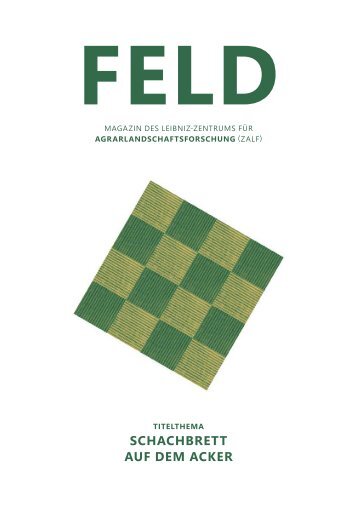
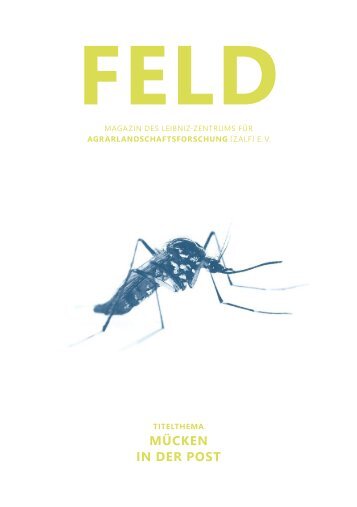
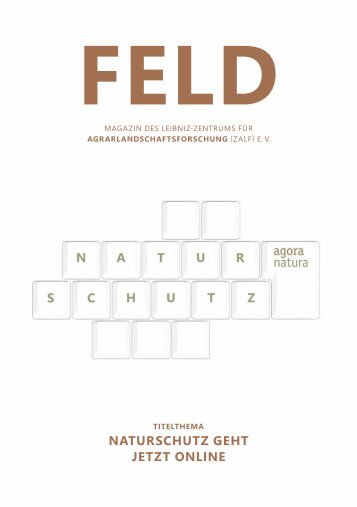
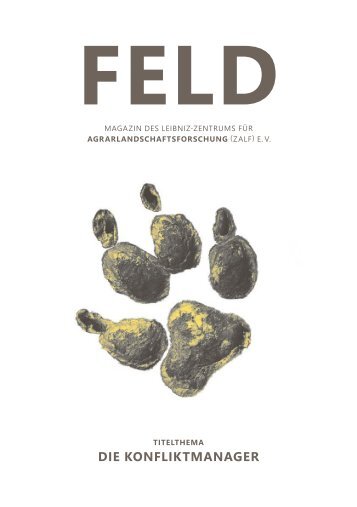
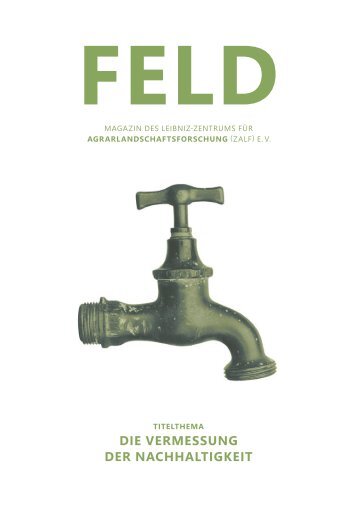
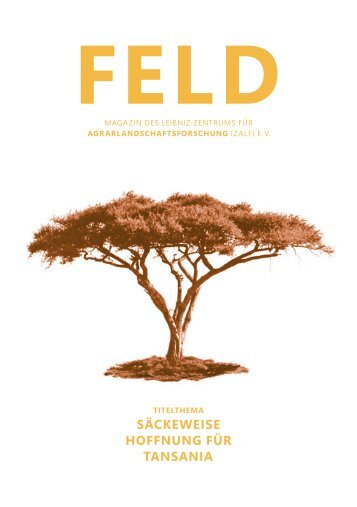
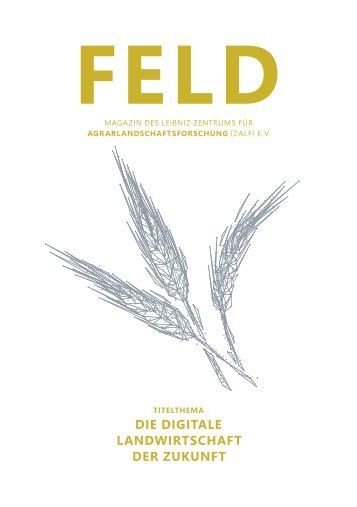
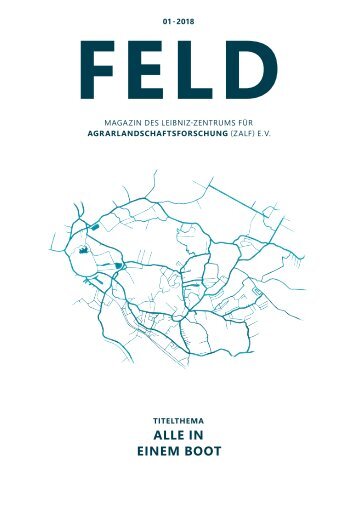
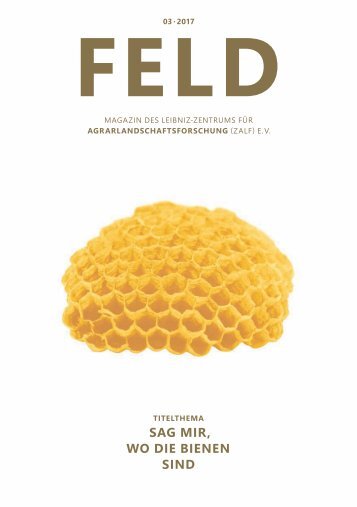
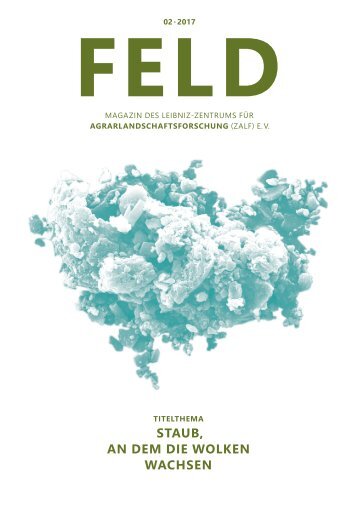

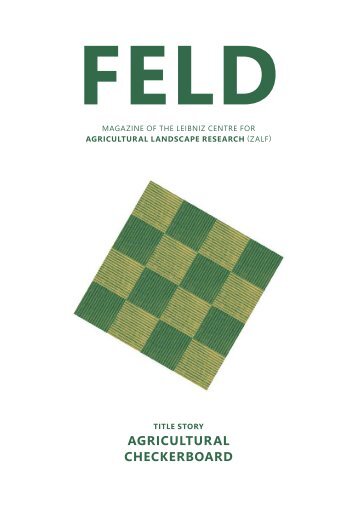

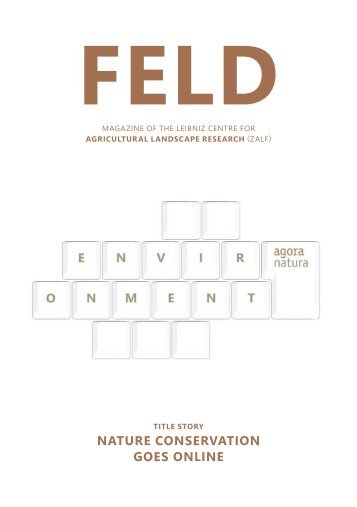








FOLLOW US
Twitter
Youtube
Instagram
LinkedIn